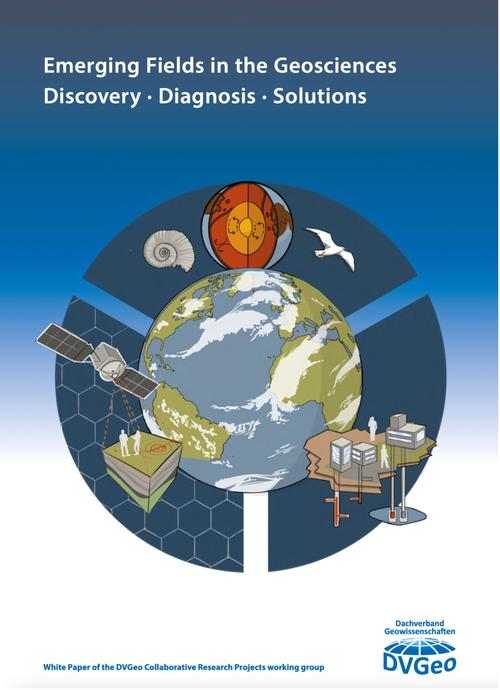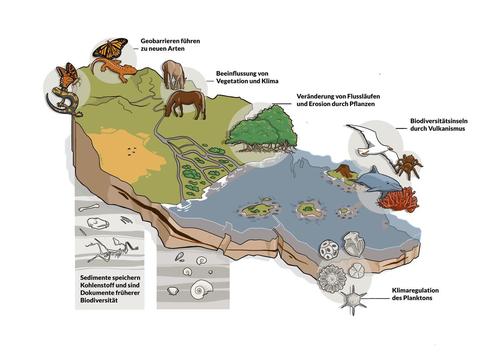Emerging Fields in the Geosciences - Research strategy paper published to tackle global challenges
White Paper of the DVGeo “Joint Projects” working group
Biodiversity, climate and geology are closely linked in the Earth system - today and in the Earth's history. Image source: DVGeo
News from Apr 07, 2025
On April 4, 2025, the Umbrella Organisation of the German Geosciences Associations(DVGeo) presented a groundbreaking white paper for future geoscientific research at the Museum für Naturkunde Berlin. The strategy paper “Emerging Fields in the Geosciences” emphasizes the role of interdisciplinary collaborative research in tackling global challenges. These include the reduction of greenhouse gas emissions and a climate-friendly supply of energy and raw materials while respecting the sensitive limits of the Earth system. The white paper was largely developed with the help of researchers from Freie Universität Berlin - in particular geochemistry professor Friedhelm von Blanckenburg, spokesperson for the DVGeo's “Collaborative Projects” working group.
The paper formulates a vision for geoscientific research that is dedicated to three current questions facing humanity: How did the Earth, other planets and life come into being? How do we measure and simulate the Earth's transformation? What solutions and options for action can the Geosciences contribute to solving the major and pressing issues of our time?
“Above all, the strategy paper also includes proposed solutions to mitigate the major crisis facing the Earth system and therefore humanity - man-made climate change. We are showing examples of how the changes to which the Earth is exposed can be measured using modern methods and quantified using innovative IT processes, and how strategies for dealing with these changes can be developed from this,” emphasizes Prof. Dr. Friedhelm von Blanckenburg from the Institute of Geosciences at Freie Universität Berlin.
However, the Geosciences have always been characterized by a spirit of discovery. The white paper calls for targeted collaborative research projects. These should focus on an integrated understanding of the Earth system. The complex relationships between the parts of our planet, e.g. the forces in the Earth's crust and sudden earthquakes or the occurrence of water underground, will be determined. This approach should provide fascinating insights into the history and development of life on Earth with a view to future planetary missions for the exploration of exoplanets. The paper focuses on “solid Earth” research topics. “Geosciences play a key role when it comes to understanding complex processes in the Earth system - and translating this knowledge into concrete contributions for our future,” says Prof. von Blanckenburg.
With the white paper, DVGeo is also making a clear appeal to the geoscientific community: tackling the challenges ahead requires intensive and committed collaboration in order to utilize the strengths of the interdisciplinary geosciences.
DVGeo is an overarching geoscientific association whose aim is to promote the geosciences, represent them in politics and society and transfer knowledge. In addition to its work in the joint projects working group, it offers information events on topics such as climate and energy or the search for a final repository and organizes the German Geosciences Olympiad. Founded in Berlin in 2015, the umbrella organization represents the four major geoscientific societies from Geology (DGGV), Mineralogy (DMG), Geophysics (DGG) and Palaeontology (PalGes). Together with the associated members from Clay Mineralogy (DTTG), Hydrogeology (FH-DGGV), the professional association (BDG) and the State Geological Services, the umbrella organization represents around 10,000 geoscientists. (cxm)

